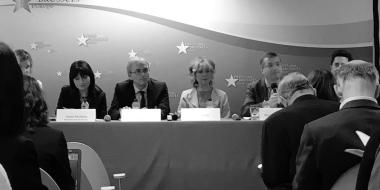EU and international experts discussed the relevance and interaction of the various existing non-financial and sustainability reporting frameworks at a recent ACCA-CDSB roundtable in Brussels.

Society’s changing expectations of the corporate sector have been matched by the emergence of a range of new reporting guidance, some voluntary, some mandatory. However, the absence of agreed, standard terminology for describing and defining the components of the sustainability reporting landscape contributes to the confusion and complexity that currently characterises it. As far as sustainability reporting is concerned, we seem to be moving in the right direction, but we are still somewhat uncertain about our final destination.
To address and discuss these concerns, ACCA (the Association of Chartered Certified Accountants) and CDSB (Climate Disclosure Standards Board) recently launched a new report called Mapping the sustainability reporting landscape: Lost in the right direction, during an expert’s roundtable in Brussels. The report, which provides a useful ‘sustainability compass’ to help companies navigate the constantly shifting landscape that is corporate sustainability reporting, was the starting point for a lively debate between experts on the relevance and interaction of the various existing non-financial/sustainability reporting frameworks. The issue of the implementation of the Non-Financial Reporting Directive and its implication for companies reporting on extra-financial information, as well as sustainability reporting globally were also addressed.
Jimmy Greer, Senior Manager, Business Focus, ACCA said: “From the EU Directive on disclosure of non-financial information to the recently created Task Force on Climate-related Financial Disclosures, demand for effective sustainability reporting has never been greater. But while the depth of sustainability reporting continues to improve, the landscape lacks coherence and the resulting fragmentation could result in it failing to live up to its potential.
The report we are launching today addresses key concerns for the discipline and makes a set of common sense proposals aimed at ensuring that sustainability reporting can continue to help companies deliver a prosperous future”.
The debate revealed that a reasonable balance between stakeholder demands and companies’ capacity to produce additional information has to be found. It also revealed a clear consensus on the need to enhance the existing dialogue between all parties - regulators, companies, investors, civil society, and other stakeholders - and to agree on common objectives, on common language and common principles to make sustainability reporting more meaningful and create clarity for investors. It was stressed that greater alignment between frameworks, as well as a better understanding of where overlapping requests for information are made, would result in an improved sustainability reporting landscape able to reduce duplication and to build a sense of shared objectives. It was also noted that regulators have a role to play in finding common ground and comparability between the different reporting schemes.
The panel also highlighted other areas that merit vigilance, such as the effect on competitiveness, the need for any new practices to have the appropriate legitimacy and better understanding of claims related to directors’ liabilities.
Cora van Nieuwenhuizen, MEP warned: “Financial reporting standards have been out there for quite some time and we are still figuring out the details for it. The reason for that is complexity. It is not about the amount the information – it is about its quality. Not everything that is measurable is of value and not everything of value is measurable. We need to keep that in mind and focus on relevant information for investors and society. We must be careful not to add unnecessary additional administrative burden. Do not give up the fight and the hard work on sustainability reporting, it is only the start, and it is time to grasp the momentum! ”
Lois Guthrie, Founding Director, CDSB concluded “There are technical dilemmas that need to be addressed in order to advance corporate reporting practice, such as materiality, boundaries, language and characterization. There is lots of commentary on these matters but efforts to address the technical dilemmas need to be coordinated. We also need to consider possible solutions from multi-disciplinary sources such as natural law, engineering and systems thinking. Technology is also likely to help in solving some issues in non-financial reporting by enabling the user to create their own report from the available data.”